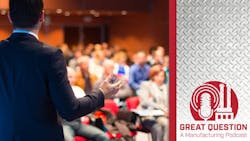Podcast: 4 reasons why you can’t miss the 2024 Leading Reliability Conference
The annual Leading Reliability Conference provides participants with the opportunity to learn more about maintenance and reliability by attending live presentations, workshops, and trainings. Held this year May 14-16 in Clearwater Beach, Florida, the intimate event offers participants the opportunity to build relationships with influential professionals from across the country. Plant Services editor in chief Thomas Wilk recently spoke with the four sponsoring organizations of the conference about what to expect at this year's event. The podcast guests include:
- Shon Isenhour, founder and owner of Eruditio
- Jeff Hay, CEO at RDI Technologies
- John Waldron, product manager at ACOEM USA
- Maureen Gribble, director of marketing for UE Systems.
Below is an excerpt from the podcast:
PS: I am already excited about getting back down to Clearwater Beach in May, especially since this is the first year (as you were telling me before we started recording) where there was an open call for abstracts. Before it was more of a system where you would talk to the people you work with and people got to speak by invitation. This year was an open call. I’m curious, Maureen, tell us how did the open call go?
MG: Yeah, it was actually really great. We realized that over the however many years now that we've been building this Leading Reliability brand and holding this conference, that our main theme always comes back to building a community. I think we've been really successful in that and anybody that's attended would probably say that they do get that sense of community at our event.
So we thought well, what better way to continue to drive that than to allow folks who have a fun and good story to tell to have that opportunity and ones that we might not know exist. We put that out there and we actually had some really good submissions, and we're really excited to hear those folks come and present. They're kind of mixed in with the customers that we have coming to present, and of course the sessions that we're all going to be presenting as well.
PS: Last year I was wowed by a couple of the presentations. One of them was from NASA, showing how motion amplification could give greater insights into the equipment that moved vehicles to the launch pad. Another one is from Los Alamos National Lab talking about a reliability program that was instituted across the facility, and it was a challenge because various parts of the facility were in various stages of reliability.
So we're going to go around the horn here and talk to each person the podcast. Shon, maybe we can start with you. I know you've had a lot of contact with the Los Alamos crew. What can we expect to hear at this year's conference?
SI: Thank you, Tom. So a couple of things. I think you’ll hear this year we've got a speaker that has never presented with us before, but it's part of a multi site implementation and that's Gallo wines. John Lazar is going to be joining us out from California and he's going to be talking about the implementation of reliability and asset management across multiple sites – how those sites differ and what you have to do, maybe a little different for one than you would for the other. So I think that'll be a great presentation, especially for directors or reliability folks that really have the responsibility over multiple sites and trying to bring them along on the journey.
Interestingly enough, I was just talking with the Los Alamos folks this week, and they're doing the exact same thing, they're continuing on what you said earlier. They're now beginning to roll out more of reliability across more of the lab, which is always interesting, and I have a feeling there'll be a few folks there as well from Los Alamos.
We've got a couple of other presentations going on during the week. I've got something that I’m pretty passionate about and which I'm going to talk about, and that is “doing the right thing and it’s wrong.” What I'm going to talk about in that presentation is a quick look at what I see in a lot of organizations specifically as they get started when people are making decisions with a very reactive mindset. They've never been proactive. They don't know what it's like to identify defects before they fail, so they can't even picture how they would be proactive.
So I'm going to talk about that and we're going to get into some of the things that people do that are right, but are for the wrong reasons. A good example of that is, when you're organizing your storeroom, and that sounds like a great thing to do from a reliability standpoint, but sometimes we're doing it just so that we can get parts quicker, and that's a reactive kind of mentality. We're going to go through about seven or eight different examples of that and talk a little bit about how to combat those.
Next, we've got a workshop on the opening day, and that one is going to be all on leadership, specifically, the must-have tools for leadership. Brian Hronchek is going to be doing that presentation, and he always does a great job with the leadership topic and helping folks get the rest of the organization pushing in the same direction that they're going. That one will be a bit of a simulation and will be kind of fun because they're going to actually apply the things that they learn as they go through that process.
I think there'll be a few more announcements as we get a little closer, but those are a few of the things that we've got coming up, at least from the Eruditio standpoint.
PS: You know, one of the things I've noted at the conference itself is that when you get presentations like Brian's presentation on leadership, leaders at the conference talk to other leaders and make connections that they can then take back on the job, so the learning continues after the conference is over.
SI: Yes, I think that's very true. I think people look around the room and they see who's shaking their heads or they see who's interested in certain topics, and I think that leads on to additional conversation as we go through the week. You said it earlier, there's one of the that's one of the things I think Leading Reliability does really well, is you do actually get the time to sit down and talk with those folks that you saw in those sessions, and really pick their brains and learn from each other. And it's a two way street.
Read the rest of the transcript
About the Podcast
Great Question: A Manufacturing Podcast offers news and information for the people who make, store and move things and those who manage and maintain the facilities where that work gets done. Manufacturers from chemical producers to automakers to machine shops can listen for critical insights into the technologies, economic conditions and best practices that can influence how to best run facilities to reach operational excellence.
Listen to another episode and subscribe on your favorite podcast app
About the Author

Thomas Wilk
editor in chief
Thomas Wilk joined Plant Services as editor in chief in 2014. Previously, Wilk was content strategist / mobile media manager at Panduit. Prior to Panduit, Tom was lead editor for Battelle Memorial Institute's Environmental Restoration team, and taught business and technical writing at Ohio State University for eight years. Tom holds a BA from the University of Illinois and an MA from Ohio State University
